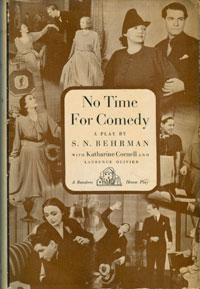|
 |
No
Time for Comedy
S. N. Behrman
New York:
Random House, 1939
First edition in dust jacket |
|
Whether Behrman’s disappointment over the
fiasco with the failed Wine of Choice prompted him to
transfer his loyalties away from the Theatre Guild must
remain conjecture. Joining the Playwrights’ Producing
Company as its fifth founding member assured him of greater
control with future productions of his, although that aspect
of the creative process never concerned him much. The
originators of the Playwrights’ Company, Robert E. Sherwood
and Elmer Rice, were adamant in their distaste for the
Theatre Guild’s production practices. The other two members
of Playwrights’ Company, Maxwell Anderson and Behrman’s
personal friend Sydney Howard, held similar views about the
Guild. Mainly they objected to producers Langner and Helburn
tampering with their texts, a phase of production and
preproduction that Behrman accepted as matter of course.
Reviewing the first matinee of End of Summer in
Boston, one critic observed: "Philip Moeller, Theresa
Helburn, Lee Simonson and others of the Theatre Guild staff
were buzzing around at the stage box to speak to the
players. I had the feeling that they were constantly
changing both the lines and the business. I know that this
is one of the best known theatrical sports, rewriting the
play every night after the show during the tryout weeks, and
playing a different version each day." Behrman’s new
alliance with the Playwrights’ Company did not prove to be
totally frictionless concerning practical measures. For
their first venture with Behrman, they found themselves
obliged to co-produce No Time For Comedy starring
Katharine Cornell – with whatever trepidations and lack of
enthusiasm – owing to previous agreements with that
manager/leading lady. Sole control over matters of
production provided a basic tenet of the Playwrights’
founding. This new joint association, however, constrained
them to cast Cornell as she made her first attempt at light
comedy – with a welcomed, surprising degree of personal
success. In No Time For Comedy, a seven-year itch
induced largely by a writer’s block infects playwright
Gaylord Esterbrook. In the presence, if not precisely the
arms, of "the other woman," Amanda, Gaylord’s writing
problem seems dispelled. Moreover, instead of permitting him
to write trivial comedies, where he displays unquestioned
mastery, Amanda inspires Gaylord to write a profound drama.
"Rot," thinks actress-wife Linda Esterbrook, somewhat out of
practical concern as she awaits the fourth of her husband’s
comedies as her next triumphant vehicle. (Her tolerance had
already forgiven him his assumed infidelity.) Better to
write successful trivial comedies than shallow tragedies.
Why not a comedy based on their own romantic triangle at a
time when the world is precariously perched on total chaos,
and her husband, masking his need for "experience" with a
kind of altruism, wants to run off to join the Spanish
insurgents? What better time for comedy than a period when
"The more inhuman the rest of the world the more human we.
The grosser and more cruel the others the more scrupulous,
the more fastidious, the more precisely just and delicate
we." Her justification? "One should keep in one’s own mind a
little clearing in the jungle of life. One must laugh."
Gaylord recognizes the wisdom of his wife’s reasoning and
prepares to write his latest comedy based on his experience
with Amanda. This successful offering has been regarded by
many as faintly autobiographical. This must remain a moot
point in the absence of any comments from Behrman, who
jealously guarded his private life. But he dedicated No
Time For Comedy to his wife, Elza. |
|